2023 Digital Marketing Survey Report
It’s time to report on our 2023 Digital Marketing Survey! Every year, Wellspring Digital surveys CMOs, CEOs, and Marketing Professionals to get a read on how they plan to budget and strategize for digital marketing in the year ahead.
Read below to see the questions and answers from over 130 respondents.
Respondent Data
Our first question helps set the stage, so you know who responded to this survey and what position they hold in their companies:
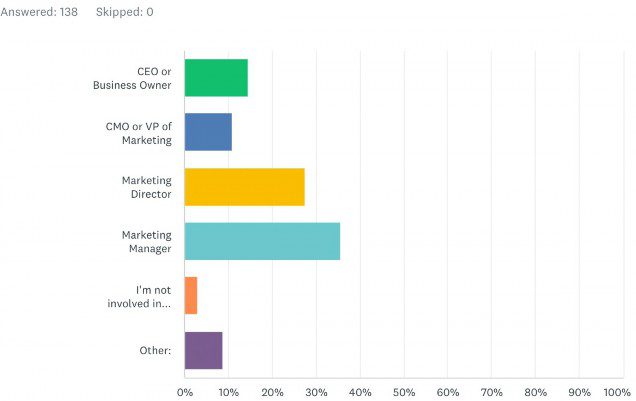
The highest number of respondents were Marketing Managers (36%) and Marketing Directors (28%). 14% were CEOs or owners, and 11% were CMOs or VPs of Marketing.
This means that 88% of the individuals surveyed were able to make the final decision on marketing matters, while 12% were either not involved with marketing or chose “other.”
Marketing Budgets
Most businesses try to nail down their marketing budgets in Q4 or at the beginning of Q1. Our respondents already seemed to have a good idea of their budgets, with only 9% marking “unsure” as their response.
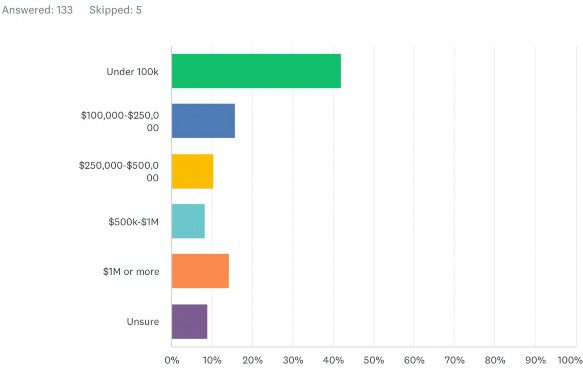
Only 14% of respondents said their marketing budgets were over $1M, but almost 20% had budgets between $250,000 – $1M. That left 16% of respondents with $100,000 – $250,000 budgeted for the year and 42% under $100,000. That’s not surprising, given the state of the economy.
Do your sales and marketing teams have separate budgets?
We ask this question every year, and while more people respond that they keep their marketing and sales budgets separate, the spread sometimes differs. This is one of those years.
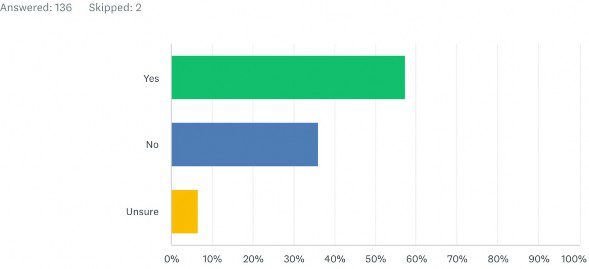
Last year, 65% of respondents said yes, while only 57% did this year. That’s still more than half, but in a year of leaner budgeting, it’s interesting to see companies combining those budgets.
“Smart companies combine sales and marketing elements for better results, but we recommend carving out separate budgets so you can track how your marketing efforts are feeding leads to your sales org.”
Karl Hindle, CEO, Wellspring Digital
Do you have a dedicated digital marketing team, and if so, how many people are in it?
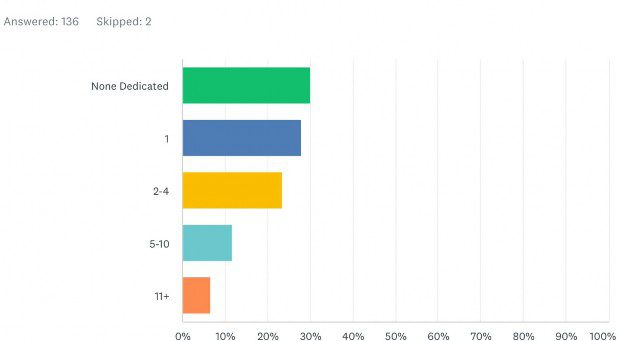
We get a similar response almost every year to this question. This year, 30% of respondents said they did not have a dedicated digital marketing team.
More than half of the respondents have a small digital marketing team of fewer than five employees. 12% had a team of 5-10, while 7% had a team of 11 or more. Which leads to our next question about whether the team is in-house, outsourced, or both.
Does your company engage digital agencies or handle all marketing in-house?
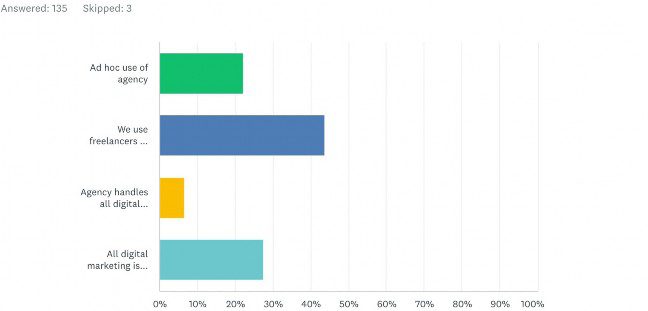
28% of respondents said that they handled all digital marketing in-house, which is almost the same as last year.
7% said that an agency handled all their digital marketing efforts, while 22% said that they used an agency on an ad hoc basis. 44% said that they used freelancers and contractors as needed.
From our experience, we find a combination of in-house and outsourced works best as long as there is a clear determination as to who is in charge of both teams and who reports to whom. An open line of communication is critical in this type of combined marketing team effort.
Of course, we then wondered what functions these companies chose to outsource.
Does your company outsource to agencies or contractors any of the following?
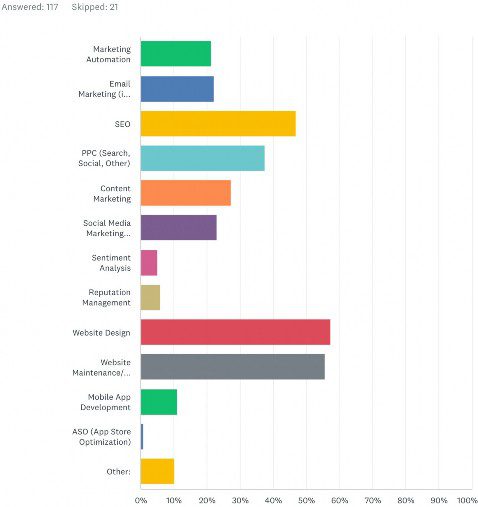
The highest percentage of respondents (47%) said they outsourced SEO, and 38% said they outsourced PPC. 27% said they outsourced content marketing, while between 20% and 23% outsourced marketing automation, email marketing, and social media marketing.
More than half of the respondents said they outsourced website design and website maintenance/hosting, and smaller percentages said they outsourced mobile app development, ASO, and other marketing services.
The only way to outsource effectively is to take an honest look at your team and their capabilities. Play to your strengths but also know when you need help. The breakdown in this answer is varied which is no surprise to us.
Overall Marketing Strategy
We wanted to know how many businesses we polled had a defined digital marketing strategy and how it fits into their overall marketing strategy. Marketing strategies can differ from company to company and industry to industry.
Sometimes, a company will have a digital strategy in mind, but they don’t focus on traditional marketing methods or a holistic approach to lead generation and brand awareness. Other times, a company will have an overall strategy but fail to solidify its digital marketing strategies.
Do you have a defined overall marketing strategy?
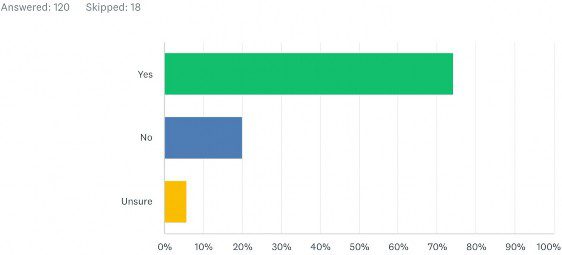
For this question, we were asking if respondents had a defined overall marketing strategy and not just a digital marketing strategy.
Most respondents said they had a defined overall marketing strategy, at 74%. 20% did not, and 6% were unsure.
Do you have a defined digital marketing strategy?
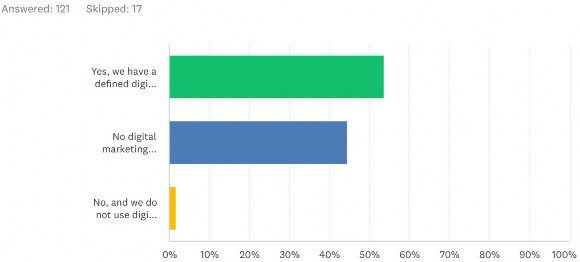
More than half of respondents (54%) said they had a defined digital marketing strategy, while 46% said they did not.
This is somewhat surprising as digital is such an important and powerful channel these days. While overall marketing strategies are important, outlining a specific strategy for digital is a must if you hope to see success in that area.
Is your digital marketing strategy integrated into your overall marketing strategy?
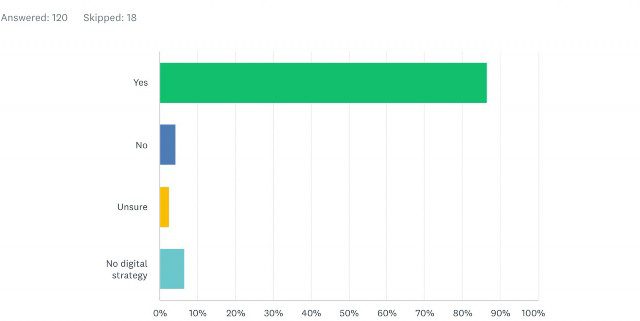
That said, most respondents said that their digital marketing strategy was integrated into their overall marketing strategy (87%). 7% said they didn’t have a digital marketing strategy, and 2% were unsure. 4% said they did not have one.
Again, we think a clearly defined digital marketing strategy is important and should be given the attention it deserves.
Is your digital marketing team achieving targeted goals?
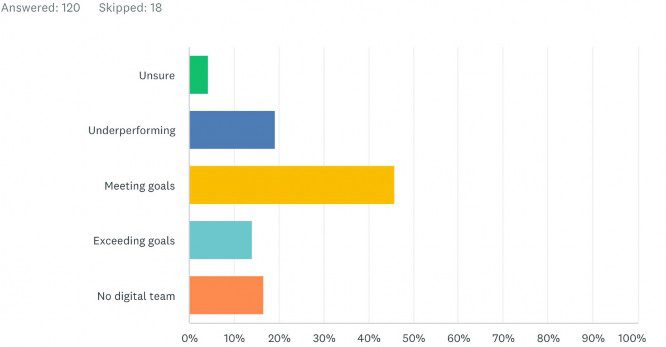
Almost half the respondents (46%) said that their digital marketing teams were meeting targeted goals, while 14% said that those teams were overachieving.
19% said that their digital marketing team was underperforming, 17% said they did not have a digital marketing team, and 4% were unsure. Again, it’s supremely important to set the right goals, outline an appropriate strategy, and devote the proper resources to your digital marketing efforts.
A Deep Dive into Digital Marketing
Next, we got into which aspects of marketing were important to our respondents, and where they allocated the most budget. This is where it gets very interesting for us.
We started with goal-based marketing.
Do you have defined/discretionary budgets for the following?
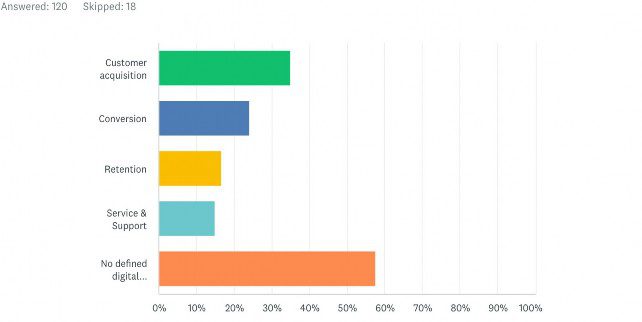
58% responded that they didn’t have a defined digital marketing budget for customer acquisition, conversion, retention, or service & support. 35% said they had budgeted specifically for customer acquisition, and 24% said the same for conversion. Fewer respondents had budgeted for retention (17%) and service & support (15%).
In our opinion, this is where the rubber meets the road and speaks to the need for sales and marketing alignment. If you’re not tracking ROI, which is ultimately what this is, how can you be sure your digital marketing dollars are being spent effectively?
Then we asked about digital channels.
Have you targeted your market by digital channels? (Paid, SEO, Social, Etc.)
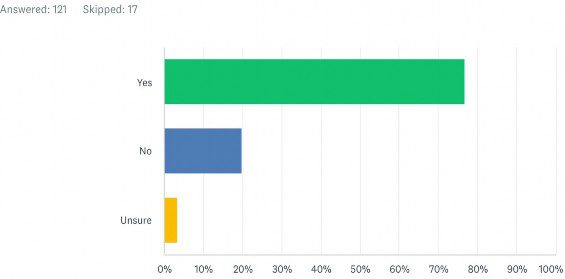
The majority of respondents said yes, they targeted their market by channel (77%). Less than 20% responded negatively, and 3% were unsure.
We wanted to know which digital marketing disciplines were most important to our respondents, so we asked them about their efforts.
Which digital marketing disciplines have you used in the last 12 months?
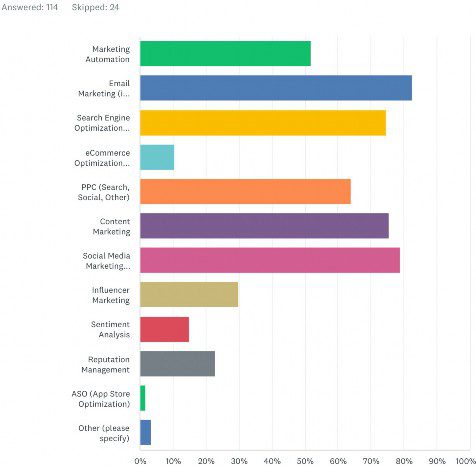
82% said that they use email marketing (separate from marketing automation). Other disciplines that were commonly used among respondents were social media marketing (79%), content marketing (75%), SEO (75%), PPC (64%), and marketing automation (52%).
Less than half engage in influencer marketing (30%), reputation management (23%), and sentiment analysis (15%). 11% engage in ecommerce optimization, a lift over 8% from last year. Only 2% use ASO (app store optimization), a new category in this year’s survey.
These results were not a surprise and typical compared against the anecdotal evidence gathered from our clients. That said, we expect to see an increase among small businesses in their use of tactics like influencer marketing, reputation management, and sentiment analysis as the tools for these become easier to use and widely available.
Next, we wanted to know which marketing discipline yielded the most success for our respondents in 2022.
Where have you had the most success in 2022?
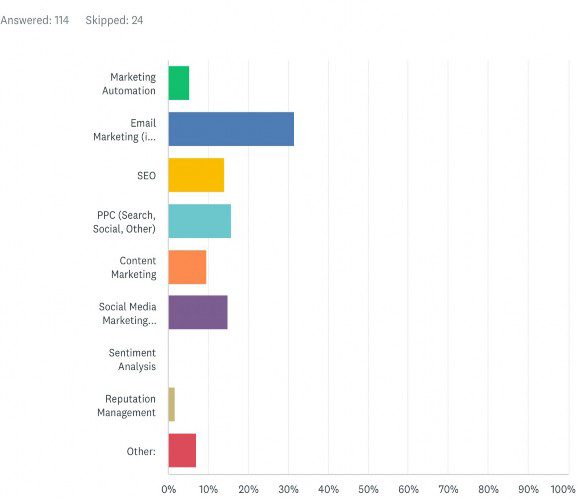
Like last year, the highest number of respondents (32%) had the most success in email marketing. This is encouraging, especially considering new privacy policies and different email automation systems” increased rules.
PPC had 16% responses, while social media had 15%. The rest were not all that successful, with less than 10% affirmative responses. This tells us that, when executed correctly, email is still a powerful weapon in your digital marketing arsenal.
Where have you had the least success in 2022?
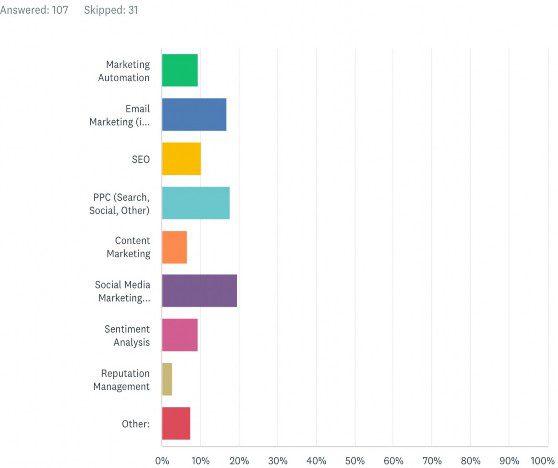
Social media marketing (20%), PPC (18%), and email marketing (17%) were the top responses in the “least successful” category too. This tells us that our wide range of respondents are all experiencing different challenges in digital marketing channels.
9% responded that marketing automation efforts were the least successful, and the same number mentioned sentiment analysis. A handful reported that content marketing (7%) and reputation management (3%) were least successful, and 7% responded “other.”
It really boils down to strategy and execution when utilizing a digital marketing tactic.
Digital Marketing in 2023, and a Look Back at 2022
We wanted to know what our respondents planned for 2023, and how the events of 2022 impacted those decisions.
Do you plan to increase or decrease your digital marketing budget in 2023?
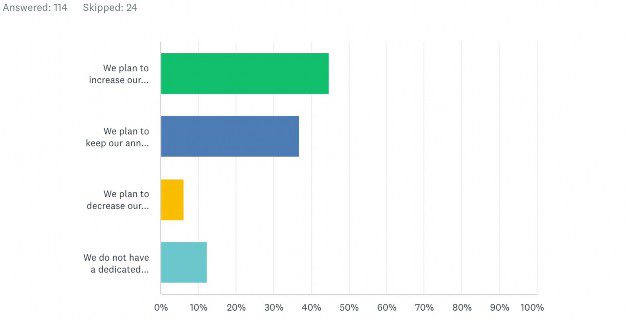
The majority of respondents said they planned to increase their digital marketing budget (45%) or keep it the same (37%). This is in keeping with what most of our clients have communicated to us.
12% said they did not have a dedicated digital marketing budget, while 6% were going to decrease their budgets in 2023. The economic uncertainty we’re facing is being handled differently by different organizations.
We will also argue for an increase in spending as long as strategy and planning play a part in execution of these efforts. But we wanted to see if respondents agreed.
How has the recession affected your digital marketing budget in 2022?
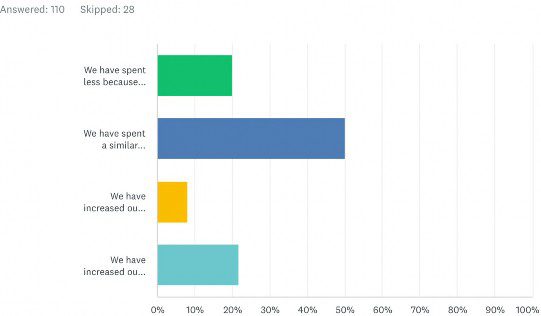
Half of respondents said that they spent the same, despite the recession. 20% said they spent less and 22% said they”d increased their spending despite recession fears. 8% said they increased their spending BECAUSE of recession fears.
Therefore, tracking ROI by channel is very important. Guessing your way through a recession is obviously a bad idea. Have a plan and be ready to track results and course correct if necessary. Agility is key to succeed during a period of economic uncertainty.
Where do you plan to decrease spending in 2023?
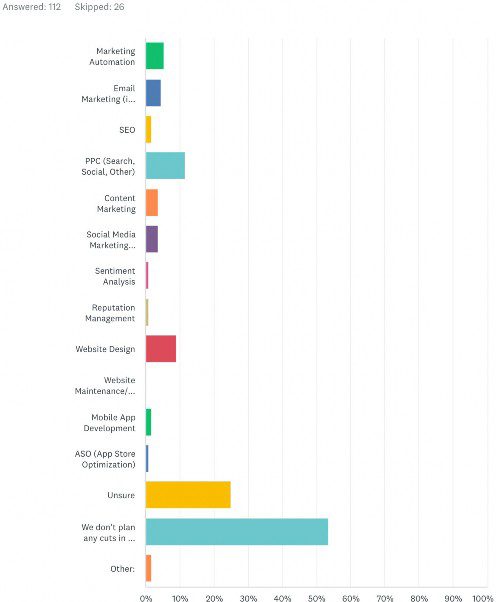
More than half (54%) of respondents said that they didn’t plan to cut any of their digital marketing budgets in 2023. 12% said they would decrease the budget on PPC, and a handful planned to decrease spending on just a few digital marketing disciplines. 25% were unsure.
This is common throughout our digital marketing survey. A lot of marketing professionals don’t know where they will decrease spending until Q1 closes. It will be interesting to watch how Q1 unfolds but so far it seems that opportunities for digital marketing success are out there.
Where do you plan to increase spending in 2023?
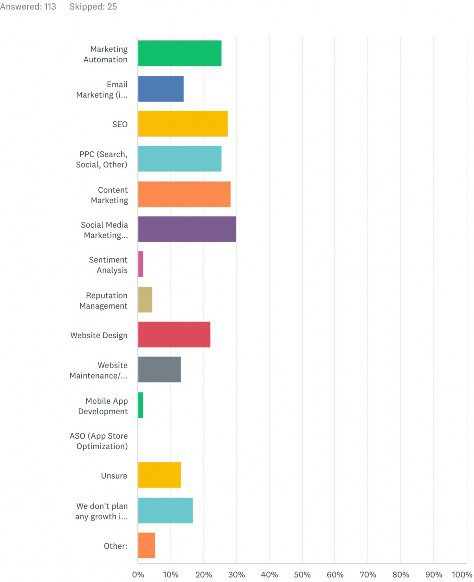
Most marketing professionals plan for an increase in spending early so that they can make sure they build enough into the budget for the coming year.
We had a good mix respond that they would increase spending in social media marketing (30%), content marketing (28%), SEO (27%), PPC (26%), and marketing automation (26%). 22% said they would increase spending on website design, and a handful of responses were sprinkled among the remaining categories.
No surprises here.
What do you feel are your major challenges heading into 2023?
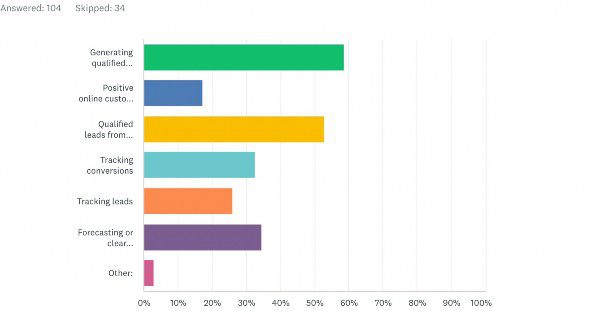
We asked respondents to check all options that apply and found that many see challenges in almost every digital marketing outcome.
Generating qualified website traffic (59%) seemed to be a large pain point, along with getting qualified leads from the website (53%). This is expected as we find that new clients almost always express the need for more traffic and qualified leads.
Forecasting and tracking conversions were also concerns, at 35% and 33%, respectively. Others cited tracking leads (26%) and creating a positive online customer experience (17%) as concerns. The only way to overcome these challenges is to measure your digital marketing efforts and course correct when warranted.
Which digital marketing tactics and channels do you feel your team could benefit from help in understanding or implementing more effectively?
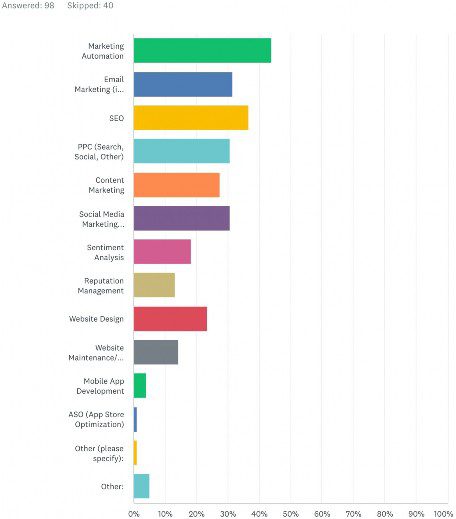
Again, we asked respondents to check all the channels and tactics that applied. We found that almost half thought their team could benefit from help in marketing automation (44%). SEO (37%), email marketing (32%), social media marketing (31%), PPC (31%), and content marketing (28%) ranked as well.
Others felt website design (23%) could use some help, and sentiment analysis (18%), reputation management (13%), and website maintenance/hosting (14%) remain a concern for marketing teams. In other words, everyone will need help in 2023. If you count yourself among these, you are not alone.
Do you plan on using any of the following in 2023?
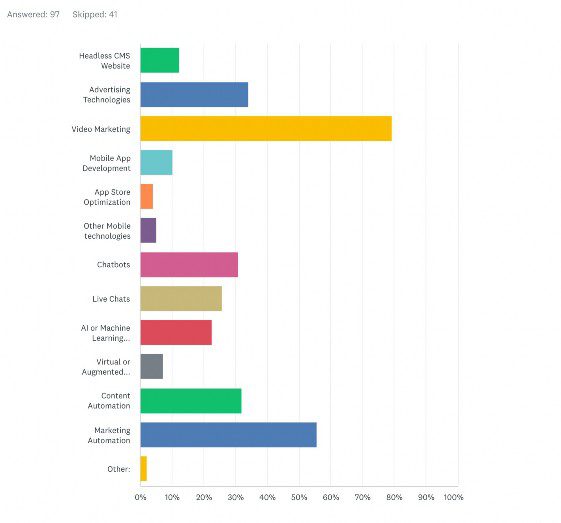
We offered some channels and tactics that we”ve been discussing with some of our clients, to see if respondents were also thinking of implementing them in 2023.
We always include marketing automation and weren’t surprised that 56% said that they would be using marketing automation in 2023. Marketing automation is complicated and requires an experienced hand to use effectively.
We also weren’t surprised to see that 79% of respondents said they”d be using video marketing in 2023. Marketing Insider Group says that consumers prefer video 80% over written text.
Chatbots (31%), live chats (26%), content automation (32%), and AI/machine learning tech (23%) were also tactics our respondents were planning on using in 2023.
Headless CMS website (12%), mobile app development (10%), and virtual or augmented reality (7%) were also flagged by a few respondents. 34% of respondents said they would be using advertising technologies in 2023.
Digital marketing is always changing with new technologies emerging almost daily. Try to avoid succumbing to shiny object syndrome. Focus on using the technologies that you know will get you in front of the right audience.
What services do you plan on bringing in-house for 2023?
We are always interested in which digital marketing services our audience is hiring for.
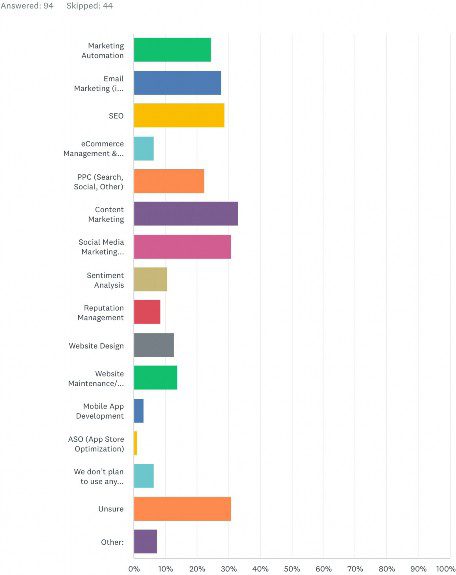
Content marketing was the top answer from this question, with 33% of respondents saying that they planned to bring a content marketing in-house for 2023. Close behind was social media marketing (organic) at 31%.
If you can bring them in-house, these are the services we almost always recommend. Your brand and voice are important, so if you can afford to hire for this and have a solid strategy, it will likely work out in your favor. That said, there is no shame in outsourcing, just be certain you have the right team, and your voice and brand are in good hands.
Marketing automation (24%), email marketing (28%), and SEO (29%) were also top of mind for our respondents. A few (13%) were going to bring website design in-house, while 14% were going to bring website maintenance/hosting in-house. 30% were unsure ” and it is a huge drop compared to last year when 43% answered “unsure” to this question.
Normally, these are services that only larger organizations hire in-house. Normally, the cost of hiring for these services can’t compete with the cost of outsourcing if you are truly comparing apples to apples.
For example, make sure the person you hire for SEO has the same skillset as the team you would outsource to at the same cost. If it costs more to hire, does that make sense? Something to ponder.
What services do you plan to outsource in 2023?
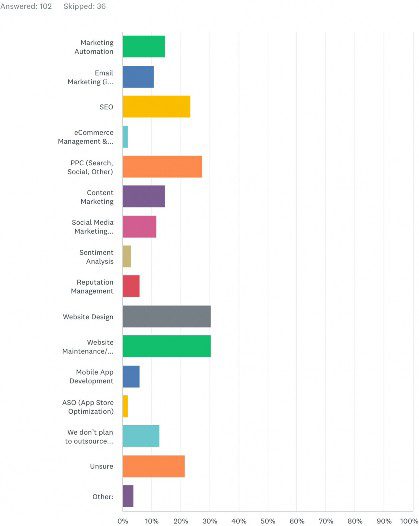
Finally, we wanted to know which digital marketing services our respondents planned to outsource in 2023. 22% were unsure.
Just over 30% planned to outsource website design and website maintenance/hosting. 27% said they planned to outsource PPC, while 24% plan to outsource SEO.
14% plan to outsource content marketing, and the same amount plan to outsource marketing automation. Some plan to outsource social media marketing (12%), and 13% don’t plan to outsource any digital marketing services.
The somewhat even distribution of these services the respondents plan to outsource tells us that no one service is the answer to your digital marketing needs.
Final Thoughts
We’re glad you took the time to read our report. That tells us that you are serious about the road ahead. To summarize, we asked our CDMO, Jon-Mikel Bailey, to share his thoughts.
As we engage in these surveys – whether this comprehensive survey or our tactic-specific surveys – we find some surprising results but also a lot of confirmation of what we believe. We believe that digital marketing requires a strategic approach. Digital marketing success is not based on feeling, it is based on how well you track results and what you do with that information as it presents itself.
If you find that your organization is operating based on “gut feelings” or “what everyone else is doing,” it is likely time to take a hard look at your digital marketing infrastructure and determine where you need changes.
Whatever you do, we strongly suggest that strategy be at the center of it all. Strategy helps you plan effectively, and course correct when and where it is needed. Use the data that is available with all digital marketing efforts.
But also, use the grey matter between your ears. You know your target audience. Market to them, not to feelings and not to yourselves. That is how you get the results you’re after.”
Jon-Mikel Bailey, CDMO, Wellspring Digital
About Wellspring Digital
Wellspring Digital is a full-service digital marketing firm with locations in Frederick, MD, Austin
Metro, TX, and Naples, FL. We specialize in digital marketing strategy, marketing automation, SEO, paid search, social media marketing, content marketing, email marketing, and website design & development with SailFish, a managed business hosting platform built in the Cloud.
If you would like to learn more about Wellspring Digital, please contact Karl Hindle at 301.477.9574 or karl@wellspring.digital